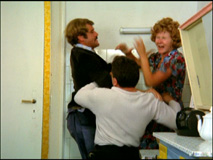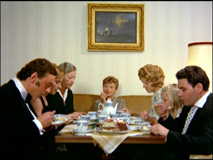|
Newest Reviews:
New Movies -
The Tunnel
V/H/S
The Tall Man
Mama Africa
Detention
Brake
Ted
Tomboy
Brownian Movement
Last Ride
[Rec]³: Genesis
Hara-Kiri: Death of a Samurai
Indie Game: The Movie
Abraham Lincoln: Vampire Hunter
Old Movies -
Touki Bouki: The Journey of the Hyena
Drums Along the Mohawk
The Chase
The Heiress
Show
People
The Strange Affair of Uncle Harry
Pitfall
Driftwood
Miracle Mile
The Great Flamarion
Dark Habits
Archives -
Recap: 2000,
2001, 2002,
2003, 2004
, 2005, 2006,
2007 , 2008
, 2009 ,
2010 , 2011 ,
2012
All reviews alphabetically
All reviews by star rating
All reviews by release year
Masterpieces
Screening Log
Links
FAQ
E-mail me
HOME
| |
The Merchant of Four Seasons (Rainer Werner Fassbinder)
1972
 The harmful strains of capitalism strike again in Rainer
Werner Fassbinder’s volatile 1972 melodrama The Merchant of Four Seasons,
though this time instead of chewing up one of the members of a fringe
subculture, they set their sights on Hans Epp (Hans Hirschmüller), a straight,
middle-aged working-class average citizen. The disappointing black sheep of a
haughty bourgeois family, Hans starts the film working as a fruit peddler, a job
he’s landed in after being fired from his job with the police force of a
behind-the-desk sexual dalliance. With a wife and a child to support and hours
of strenuous labor waiting for him each day, he’s too focused on the task at
hand to have much time for self-examination. The best he can hope to do during
the day is to grab a drink at the pub while traveling from alleyway to alleyway
or to have a flirtatious moment with a female customer while making a delivery
(while his suspicious wife keeps track of the time he spends inside her
apartment complex). Eventually, however, the daily grind wears him down,
prompting an episode of rebellion in which he steps out of line in a way that
leaves him unable to continue his job duties. The presence of free time brings
about in him a search for an identity that he’s spent much of his life
attempting to suppress in pursuit of money and survival.
The harmful strains of capitalism strike again in Rainer
Werner Fassbinder’s volatile 1972 melodrama The Merchant of Four Seasons,
though this time instead of chewing up one of the members of a fringe
subculture, they set their sights on Hans Epp (Hans Hirschmüller), a straight,
middle-aged working-class average citizen. The disappointing black sheep of a
haughty bourgeois family, Hans starts the film working as a fruit peddler, a job
he’s landed in after being fired from his job with the police force of a
behind-the-desk sexual dalliance. With a wife and a child to support and hours
of strenuous labor waiting for him each day, he’s too focused on the task at
hand to have much time for self-examination. The best he can hope to do during
the day is to grab a drink at the pub while traveling from alleyway to alleyway
or to have a flirtatious moment with a female customer while making a delivery
(while his suspicious wife keeps track of the time he spends inside her
apartment complex). Eventually, however, the daily grind wears him down,
prompting an episode of rebellion in which he steps out of line in a way that
leaves him unable to continue his job duties. The presence of free time brings
about in him a search for an identity that he’s spent much of his life
attempting to suppress in pursuit of money and survival.
 In the capitalist German society where Fassbinder’s film
takes place, occupation and identity are intrinsically tied, and the disdain
that Hans meets when confronting his family is obviously rooted in their
disappointment that he has failed to live as a member of the class that he was
born into. It’s plain to see that his wife is rather disappointed with him as
well, and one of Fassbinder’s greatest achievements here is the way he
convinces us that their sexual fidelity is as much a financial consideration as
an emotional one. He does that mostly by introducing us to the characters on
their terms and showing their business to us so we can better understand the
scale of this drama. The noncommittal emotional distance that Fassbinder takes
from most of the action is contrasted with the frequent exaggerated zoom shots,
which coincide directly with some of the emotional heights that the characters
feel, and as a result he places the audience where they can be at once
sympathetic to the characters’ plights yet are able to be analytical when
considering their actions. The way the film is structured, audience sympathy
shifts a bit from Hans’ wife to Hans himself before it becomes apparent that
both are victims of the economy. Their actions aren’t exactly excusable, but
the immediacy of ruin gives them few alternatives. The seemingly simple thesis
of the movie, which is that the pursuit of personal happiness and the possession
of ideals are impossible in a capitalist society, is adeptly demonstrated, and
each character’s presence adds further layers to that observation. By the
disheartening, but not disingenuous, end of the film, Fassbinder stacks the deck
so that Hans’ pathetic rebellion seems the only brave act possible, since it
seems his only escape from a life of suffering.
In the capitalist German society where Fassbinder’s film
takes place, occupation and identity are intrinsically tied, and the disdain
that Hans meets when confronting his family is obviously rooted in their
disappointment that he has failed to live as a member of the class that he was
born into. It’s plain to see that his wife is rather disappointed with him as
well, and one of Fassbinder’s greatest achievements here is the way he
convinces us that their sexual fidelity is as much a financial consideration as
an emotional one. He does that mostly by introducing us to the characters on
their terms and showing their business to us so we can better understand the
scale of this drama. The noncommittal emotional distance that Fassbinder takes
from most of the action is contrasted with the frequent exaggerated zoom shots,
which coincide directly with some of the emotional heights that the characters
feel, and as a result he places the audience where they can be at once
sympathetic to the characters’ plights yet are able to be analytical when
considering their actions. The way the film is structured, audience sympathy
shifts a bit from Hans’ wife to Hans himself before it becomes apparent that
both are victims of the economy. Their actions aren’t exactly excusable, but
the immediacy of ruin gives them few alternatives. The seemingly simple thesis
of the movie, which is that the pursuit of personal happiness and the possession
of ideals are impossible in a capitalist society, is adeptly demonstrated, and
each character’s presence adds further layers to that observation. By the
disheartening, but not disingenuous, end of the film, Fassbinder stacks the deck
so that Hans’ pathetic rebellion seems the only brave act possible, since it
seems his only escape from a life of suffering.
* * * *
10-20-02
Jeremy Heilman
|